
A


Kristen Waggoner discusses an ADF case with Michael Farris. Waggoner assumed the role of CEO, president, and general counsel October 1.



A


Kristen Waggoner discusses an ADF case with Michael Farris. Waggoner assumed the role of CEO, president, and general counsel October 1.

When I joined Alliance Defending Freedom as CEO, I had three main objectives: grow the organization, refocus its mission on Generational Wins, and train my successor. In taking this job at a season of life when many of my peers were retiring, I knew my tenure would be relatively short. But for the sake of ADF’s vital mission, I wanted to make it count.
Nearly six years later, it’s a joy to reflect on what has been accomplished thanks to God’s blessing and your support. By every measure of success, ADF has grown by leaps and bounds — from budget, to staff, to legal victories.
We’ve honed our focus on creating Generational Wins in the areas of religious freedom, free speech, the sanctity of life, parental rights, and God’s design for marriage and family.
And God has graciously enabled me to identify a capable leader who will continue to move ADF forward, advancing the cause of liberty for years to come.
On October 1, my friend and colleague Kristen Waggoner stepped into the role of CEO, president, and general counsel.
Kristen is a brilliant lawyer, a superb public speaker, and an exemplary Christian. A nine-year veteran of ADF, she served as general counsel before assuming the role of CEO. She is well-respected by leaders in the legal community — even by those who reject our worldview.
Thirteen of ADF’s 14 Supreme Court victories since 2011 have been under Kristen’s leadership. She personally argued two of those victories and will argue her third case in our nation’s highest court late this fall. Her skill as a legal strategist was proven in ADF’s considerable contribution to the overturning of Roe v. Wade — the legal victory of our generation.
While various factors are behind my decision to pass the torch — including my age, as I turned 71 this year — the most important element was what was best for ADF in the long run. Simply put, I concluded that two or three more years of Mike would not be as good for ADF as 15–20 years of Kristen. She is poised to lead ADF’s efforts to protect fundamental freedoms throughout the United States and around the world.
I have loved my time as CEO, and I’m thrilled that Kristen and the Board of Directors have welcomed my continued involvement with the organization. I look forward to focusing more on my passions of parental rights and international religious freedom.
I plan to be around for a few more seasons, but it’s time for another leader to take the helm. I cannot wait to see where the Lord takes ADF under Kristen’s leadership.
Learn about Kristen Waggoner’s vision for Alliance Defending Freedom in the Q&A on p. 19.

ADF attorneys representing a former public school administrator filed a lawsuit against the Albemarle County School Board for creating a racially hostile work environment that forced her to leave her job.
School officials severely harassed and discriminated against Emily Mais, who served as assistant principal of Agnor-Hurt Elementary School, after she raised concerns about a mandatory “anti-racism” teacher training that advocated for differential treatment based on race.
Following a slip of the tongue, Mais was branded a racist and was severely harassed and humiliated by fellow staff members. She reported the harassment to her superiors, but they allowed the behavior to continue. As a result, she felt compelled to resign from her position.

Read about parents who are also facing harmful “anti-racism” policies in Albemarle County schools on p. 9.
A former volunteer fire chaplain is suing the City of Austin after he was terminated for sharing his religious views on his personal blog.
Dr. Andrew Fox is an ordained minister who volunteered as the city’s lead chaplain for eight years. He provided a listening ear and source of prayer for firefighters as they encountered accidental deaths, suicides, and other tragedies. He provided all firefighters with equal treatment, including those in the LGBT community.
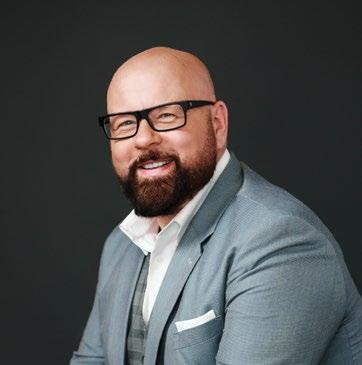
After sharing on his blog his view that men and women are biologically different and men should not compete on women’s sports teams, city officials demanded that Dr. Fox recant and apologize for expressing those beliefs. When he refused, they fired him.
ADF is representing Dr. Fox in the lawsuit. ADF attorneys successfully litigated and won a similar religious liberty case on behalf of Atlanta’s fire chief in Cochran v. City of Atlanta.
Grant Park Christian Academy serves an underprivileged community in Tampa, Florida. Every student is from a low-income family. Thanks to the school’s participation in a federal school lunch program, these children benefit from a nutritious breakfast, lunch, and snack every day, including during the summer.
But these meals were endangered by a Biden administration directive to expand the definition of sex to include gender identity. Just before the new school year, Florida officials told the school it would lose lunch funding if it did not comply with the new gender definition — which conflicts with the school’s religious beliefs on human nature and sexuality.
Days after ADF filed a lawsuit on behalf of the school, the federal government agreed to grant a religious exemption that honors the school’s religious beliefs and acknowledged an automatic statutory exemption for religious schools across the nation.
The Biden administration was forcing this wonderful school to make an untenable choice: violate its religious beliefs or stop providing lunches to children.
‘‘
Erica Steinmiller-Perdomo ADF Legal Counsel

In response to government policies and ideologies that increasingly threaten the fundamental rights of parents nationwide, ADF, The Heritage Foundation, and Family Policy Alliance have led a coalition of more than 35 policy and grassroots organizations in crafting a new “Promise to America’s Parents.”
The initiative provides a roadmap that parents, community leaders, and lawmakers can use to legally safeguard parental rights. Its principles are designed to inform decisions on policy and legislation at all levels of government, from school boards to Congress.
Visit PromiseToAmericasParents.org to learn more and download the free Parents’ Toolkit on Critical Theory.


The European Court of Human Rights undermined free speech protections for people with disabilities when it failed to rule for a French Down syndrome advocacy organization.
The court found inadmissible an application by Fondation Jérôme Lejeune claiming the French government’s decision to ban a video highlighting Down syndrome constituted censorship. ADF International represented the foundation in challenging the ban.
Hamouda and Nada, a Sudanese couple, are currently on trial for “adultery” following their conversions from Islam to Christianity. If found guilty, they may be punished by 100 lashes each. Hamouda may also face a one-year exile.

The couple were both Muslims when they married in 2016. When Hamouda converted to Christianity in 2018, Nada’s family threatened to have a Sharia (Islamic law) court dissolve their marriage. After Nada became a Christian in 2021, she returned home to her husband and their children. The couple did not consider the Sharia court’s annulment to be legitimate.
Sudanese law protects the couple’s right to choose and live out their faith, although a 2021 military coup has put this protection at risk. Those who are hostile to Christian converts can weaponize the legal system to prosecute them under false pretexts. ADF International is supporting the couple’s defense.

Featuring the voices of 15 people with Down syndrome, the video offers encouragement to pregnant women expecting a baby with the condition. “Dear Future Mom” has been watched on YouTube more than 8.4 million times and has won multiple international awards.
After the French Broadcasting Council claimed the production was not a “message of general interest,” the foundation was prevented from sharing the video on state television. The broadcasting authority claimed the message would cause offense to women who had chosen to abort an unborn child with disabilities.
The inadmissibility ruling stands in contrast to several national decisions across Europe that strongly reaffirm the right to freedom of expression.
This is a regrettable decision not just for people with Down syndrome and disability rights advocates, but for all concerned with free expression in Europe. ‘‘
Jean-Paul Van De Walle Legal Counsel, Europe, ADF International

Corporations have an incredible impact on our culture today. Large outfits in tech, banking, and finance serve billions of customers worldwide. Their products have become ubiquitous in our lives, to the point that their influence in the marketplace is inestimable. We can hardly imagine daily life without brands like Apple, Microsoft, Bank of America, or Google.
But many of these large publicly traded companies are using their wealth and influence to engage in highly politicized activism. This creates a pigeon-holed political agenda that harms shareholders, customers, and even the companies themselves.
Take Disney, for example. This year, the company announced it did not support Florida’s bill to protect parental rights in education. And after the bill was signed into law by Gov. Ron DeSantis, Disney CEO Bob Chapek released a statement saying the bill “should never have been
The Walt Disney Company has come to be an increasingly uncomfortable place to work for those of us whose political and religious views are not explicitly progressive. ‘‘
signed into law.” Parents and other Disney fans swiftly responded, publicly denouncing the company and unsubscribing from its streaming platform, Disney+. Disney employees spoke off the record as well, with one describing the “angst” they felt as a result of Disney’s political actions. “The Walt Disney Company has come to be an increasingly uncomfortable place to work for those of us whose political and religious views are not explicitly progressive,” employees wrote in an open letter to the company. “We watch quietly as our beliefs come under attack from our own employer, and we frequently see those who share our opinions condemned as villains by our own leadership.”
Disney employees in an open letter to the company
Disney didn’t do itself any favors by taking sides on a hotbutton social issue unrelated to its mission. But what’s more concerning is that its actions — and similar moves by other corporations — chip away at our nation’s cultural foundations of free speech and religious liberty.
When a publicly traded company weaponizes its shareholder dollars to insert itself into the political arena, it not only breaks trust with its own shareholders — it also sends a message to employees, customers, and the public that those with different viewpoints are not welcome. This, in turn, balkanizes the marketplace and reinforces political echo chambers.
To keep these corporations accountable, Alliance Defending Freedom has released a Business Index. The Index scored 50 Fortune 1000 companies on a host of measures to determine if they respect those with diverse political and religious views, including whether they use divisive concepts in their employee trainings and to what extent they embrace viewpoint diversity in their workplaces.
The goal is to help executive-level (“C-suite”) leaders, employees, customers, and shareholders determine whether businesses respect these key stakeholders’ freedom of expression and freedom of religion — and help companies get back on the right track.
ViewpointDiversityScore.org to learn more.
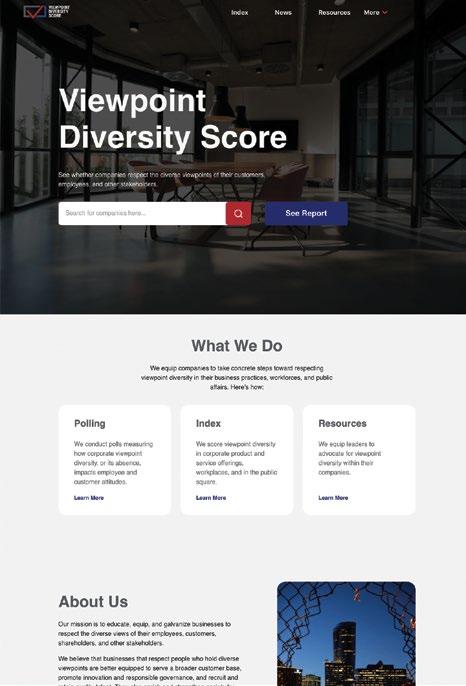
The results of the Index were even worse than expected. Benchmarked companies scored an average of 12% overall on respecting religious and ideological diversity in the market, workplace, and public square. Between engaging in Cancel Culture and censorship, it’s no wonder that employees across the country feel uncomfortable sharing their beliefs in the workplace.
Publicly traded companies should respect the diverse views represented among their key constituencies — from the C-suite to the shop floor, and across their wide base of consumers and shareholders. These corporations can and should do their part to foster a culture that values free speech and religious freedom, and that begins with saying no to activists who would leverage a company’s influence to engage in Cancel Culture.
Yet it’s clear that Big Tech platforms are currently not valuing free speech.

Consumers saw this in action when Amazon temporarily banned Abigail Shrier’s investigative book on trending transgender identification among girls. “A network of activists and their journalistic enablers have largely succeeded in suppressing a real discussion of the over-diagnosis of gender dysphoria among vulnerable girls,” Shrier said in response to the ban.
Amazon alleged that it removed Shrier’s book because it violated the company’s speech codes — an ambiguous set of rules Amazon can weaponize against ideas it disfavors. But given that Amazon has become the world’s largest online seller of books, barring certain titles puts those books at a big disadvantage and chills expression. Who would write or publish a book promoting a viewpoint that the biggest bookseller in the world won’t sell?
Yet Amazon isn’t the only company with ambiguous speech codes. Meta, owner of Facebook and Instagram, also muddies its guidelines with vague terms that can easily be used to suppress views that employees dislike.
“[W]e don’t allow hate speech on Facebook.…,” Meta’s policy reads. “We define hate speech as a direct attack against people — rather than concepts or institutions — on the basis of what we call protected characteristics.”

The Viewpoint Diversity Score Business Index rates 50 Fortune 1000 companies, evaluating their commitment to religious and ideological diversity for their employees, customers, and the general public.
How Companies Were Selected:
While viewpoint diversity matters for any business, the Business Index focuses on industries that have the greatest potential to impact free speech and religious freedom, like Big Tech and financial services.
The Goal:
The Business Index aims to hold companies accountable for practices that fail to respect freedom of expression and freedom of religion — and provide tools to help them get back on the right track.
The Results:
The results of the Index reveal that there is much work to be done. Benchmarked companies scored an average of 12% overall on respecting religious and ideological diversity in the market, workplace, and public square.
SEE how 50 companies scored on the Business Index. Visit ViewpointDiversityScore.org/ business-index
A
network of activists and their journalistic enablers have largely succeeded in suppressing a real discussion of the over-diagnosis of gender dysphoria among vulnerable girls.
Abigail Shrier author of a book temporarily banned by Amazon
Meta also links to an article stating, “There is no universally accepted answer for when something crosses the [hate speech] line.”
That lack of clear answer can only lead to biased interpretation, says Jay Hobbs, who leads communications for the Business Index:
“Anyone tasked with enforcing Meta’s ‘hate speech’ policy must rely on his or her own opinion and instincts in order to ultimately decide who gets to say what on one of the world’s largest online platforms.”
Shortly after agreeing to purchase Twitter for roughly $44 billion (a transaction now the subject of litigation), Elon Musk declared that “Free speech is the bedrock of a functioning democracy, and Twitter is the digital town square where matters vital to the future of humanity are debated.” Musk’s statement underscores the role that platforms like Twitter play in the public square, and therefore the responsibility they have to support a culture that embraces free speech.
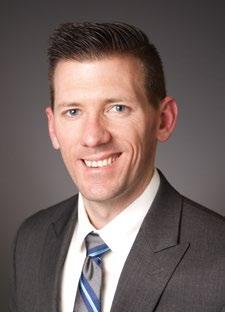
One way that companies can mitigate risks, maintain a competitive edge, and help foster a culture of free speech is by supporting viewpoint diversity. They can do this by adopting policies that bar censorship within the organization and explicitly stating that they won’t punish employees for expressing their beliefs. Policy templates are available to companies at ViewpointDiversityScore.org.
Alliance Defending Freedom is committed to fostering a culture of civility where free speech and religious liberty flourish. A big part of that includes making sure that companies today respect the free exchange of ideas.
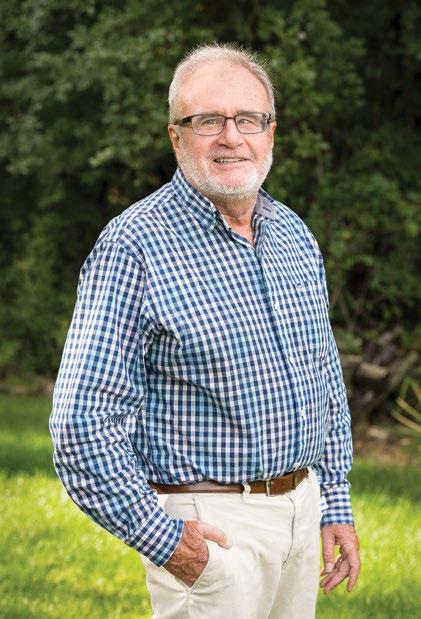
In the aftermath of the Dobbs decision overturning Roe v. Wade , much ink has been spilled to highlight the role that pro-life organizations, advocates, and attorneys played in the case. The victory was the culmination of an effort nearly 50 years in the making.
But the story of the pro-life movement is the story of millions of Americans, including thousands of passionate advocates, working to impact both the law and the culture, often without significant recognition.
Jim Donohoo, an Alliance Defending Freedom Allied Attorney for over 20 years, is one such individual. For years, he has quietly helped defend the right to life in his corner of Wisconsin.
Following law school and a stint at a law firm, Donohoo decided to strike out on his own. Despite the demands of operating his firm, he found himself drawn to critical issues beyond his day-to-day practice.
In the late 1970s, just a few years after the Roe decision, Donohoo joined the board of Citizens Concerned for Life and became deeply involved in the movement to preserve life.
Ever since I can remember, it’s just stunned me that they kill babies.
Jim Donohoo
“I get pretty passionate [about the life movement],” he says. “Abortion is such a gut-level issue. I mean, ever since I can remember, it’s just stunned me that they kill babies.”
He became involved in sidewalk counseling efforts, volunteering time outside abortion facilities to support those who urged young mothers to choose life. As an experienced attorney, Donohoo was perfectly placed to defend other pro-life volunteers who were targeted for their advocacy.
Local authorities first made it unlawful for sidewalk counselors to come within 20 feet of abortion clinics. Then they began citing the volunteers for working “in concert” with one another. Authorities claimed they violated the law any time they communicated with others who had been charged with running afoul of the ordinance — even if it was no more than two friends saying “hi.”
Donohoo began representing the counselors, regardless of whether they were able to pay for his services.
“The first month I did it, I spent 80 hours,” he says. “That’s how much [authorities] were filing these cases, left and right.” He successfully defended the free-speech rights of numerous sidewalk counselors, allowing them to continue their lifesaving work.
Fast-forward to 2019, when Donohoo felt the call to return to sidewalk counseling, this time participating directly. This summer, he found himself counseling on the day the landmark Dobbs decision was released. He experienced the joy that countless advocates — including himself — had worked a lifetime to achieve.
Wisconsin’s pre-Roe pro-life law is now back in effect, and abortion facilities are closed throughout the state. But that hasn’t stopped Donohoo from continuing to defend the unborn. In his “semi-retirement,” he and a pro-life group now travel to Illinois to continue the work of sidewalk counseling.
Like so many others in the pro-life movement, Donohoo still isn’t seeking recognition — he’s seeking to stand up for human rights, including the God-given right to life.
Jim Donohoo is married to Karen and has four children and 24 grandchildren
We’re not looking for a public school to be a conservative or Christian school. We just want it to be school. And a place where all views are respected.
‘‘
Marie Mierzejewski
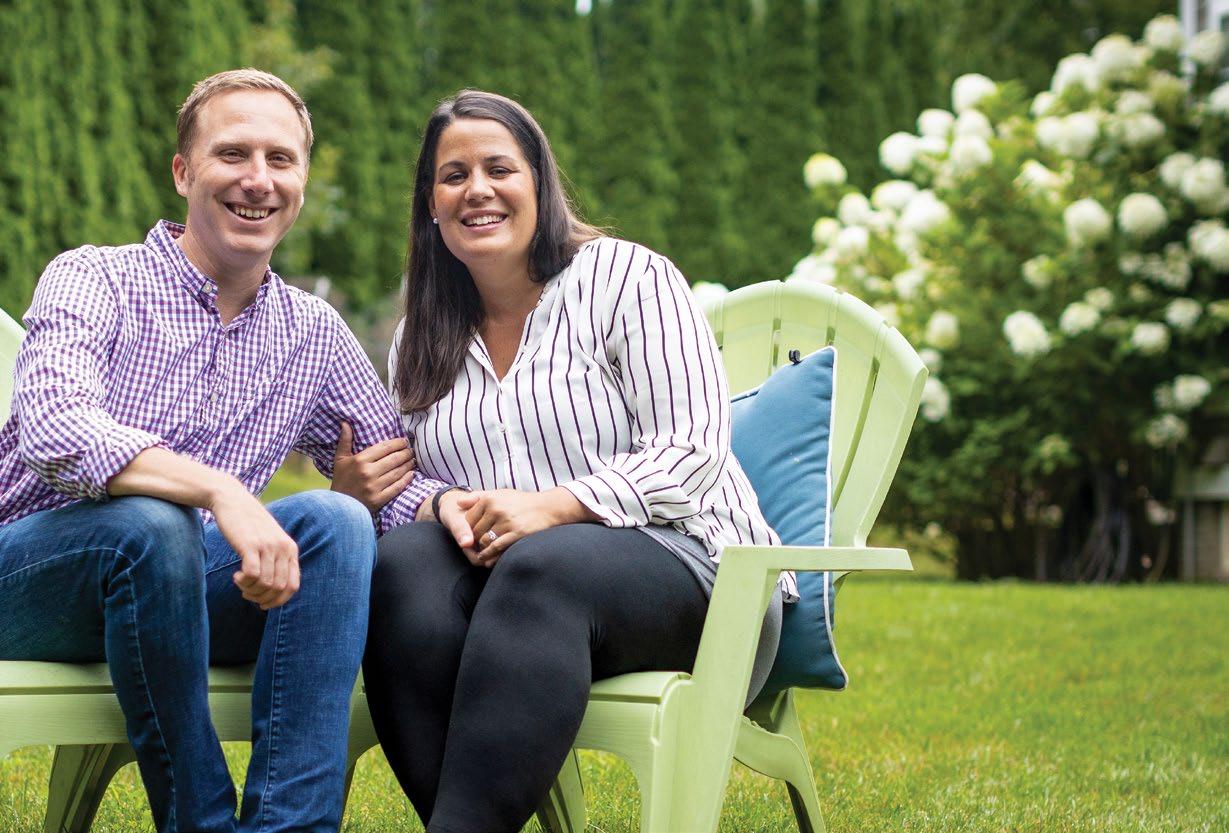



Afew years ago, on an easygoing morning in Albemarle County, Virginia, Marie Mierzejewski was in her car, running errands. Squirming and chatting in the back seat were two little boys — one, her own white son, the other, a young black friend of his — both excited to be out and on the go.
On impulse, Marie swung by Starbucks for a cup of coffee. She bought the boys cake pops and, back in the car, heard the happy smacking of satisfied sweet tooths. Then, this giggling comment:
“Isn’t this neat?” the friend said. He had chosen a chocolate pop, while Marie’s boy was nibbling vanilla. “Mine matches my face, and yours matches your face.” Marie listened to their laughter and smiled.
“It was so innocent,” she remembers. “Just acknowledging the difference — celebrating it, even. Race doesn’t have to be a divider between kids.”
But today in Albemarle County, race is being used to do exactly that: divide children, divide their parents, divide entire communities. The school board of Albemarle is seeing to that.
It has lessons to teach that have nothing to do with reading, writing, or arithmetic — and, sadly, everything to do with ending the innocence of children.
Marie and her husband, Matt, have four children — two girls, two boys — who started their education in the same elementary and middle schools Matt attended, growing up. A native of Crozet (a Charlottesville suburb), Matt met Marie, a Connecticut girl, when they were both teens. He first proposed to her — only half in jest — when they were middle and high schoolers together.
A few years passed before she took him and his second proposal more seriously.
“He loved our Lord so much,” she says. “Number One important to me was our faith and somebody who would bring me closer to that intimacy with God.” Active in their local Catholic church and community, Matt works in paid search engine advertising, while Marie is a social worker in a local assisted living and memory care unit.

Like so many of their neighbors, the family delights in the Blue Ridge Mountain scenery of the Albemarle area. Crozet is the kind of sociable community where you run a comb through your hair on the way out the door, because — grocery, park, or dentist office — you’re going to meet someone you know.
“You recognize people, you sort of know about them,” Matt says. “People are generally pleasant, and the pace of life is good, too.” Still, the Mierzejewskis’ Christian friends expressed surprise that they sent their children to public school in the first place.
“We felt like a little bit of an anomaly,” Marie admits, “because our faith is so central to us. But we really felt that’s where the Lord had us and that’s where He wanted us.” She and Matt made a special effort to reinforce their kids’ identities as believers. Marie was active in the school and would encourage them to pray over meals in the school cafeteria, or celebrate Christian holiday traditions when appropriate in their classroom settings.
“The key is that faith doesn’t feel … removed,” Matt says. “It’s part of life, not a once-a-week thing. We try to make it as much of our life as possible.”
We try to make [faith] as much of our life as possible.
Not far away from the Mierzejewskis, and active in the same Catholic parish, Carlos and Tatiana Ibañez were trying to instill those same values in their own three children. Raising solid, successful Catholic youngsters was part of the plan from the time the two met, dated, and married during dental school. Raising them in Albemarle County was not.
The Ibañezes are from Panama and came of age during the years of Manuel Noriega’s brutal dictatorship there. The experience did much to shape their understanding of political freedom.
“[The regime’s] version of ‘getting canceled’ was much more severe than it is here,” Carlos remembers. “You did not speak against the establishment.”
“You knew what to say, and what not to say,” says Tatiana. “When you were on the phone, you better not say anything that somebody else didn’t want to hear.” A cousin of Carlos challenged the Noriega regime, then vanished. His body was eventually found … but not his head.
That brutal murder, some say, helped trigger a 1989 U.S. invasion that suppressed the violent Noriega regime.
Years later, Carlos and Tatiana legally immigrated to the U.S. to pursue their education. Both studied dentistry in Panama and then at the University of North Carolina at Chapel Hill. Carlos eventually became an oral and maxillofacial surgeon and joined the staff of the University of Connecticut Health Center.
“The idea was to get this training and go back home,” he says. As he and Tatiana began raising a family, though, “we realized that this was probably a better place for our children to go to school, get their education, and have more doors open for them.” The Ibañezes became U.S. citizens and chose to build their dental practice and make their home in Albemarle County.
It sounds very cliché, but I really like the Constitution,” says Carlos, sitting near a bookshelf crowded with volumes on world and American history. “I really, truly believe in all of it. That comes with a lot of freedom and responsibility. I’ve tried to instill that in my kids — teach them that there are places that don’t have all of this. We like the freedoms that we have here.”

The Ibañezes enjoy the culture of their community as much as its natural beauty: “A lot of intellectual people here,” Carlos says. “Very diverse points of view. You can talk about different ideas.”
They wanted their two sons and their daughter to know that they, too, could talk about “different ideas” with their parents. “We keep talking with them,” Tatiana says. “We tell them if they work hard, they’ll be able to play hard.”
“Treat others with dignity and respect,” Carlos says. “Lean on your faith. Remember that you can always pray.”
“And if they hear someone say anything that bothers them, they can come to us,” Tatiana adds.
OThe Ibañezes’ daughter was confused. Her parents weren’t white, and they’d gone to good schools, enjoyed professional success, lived in a fine home. Her family was Catholic, and embraced and lived their Catholic faith.
Carlos and Tatiana requested a meeting with the teacher. They asked if she realized how racist the first video was in its assumptions, and how prejudiced the second was against people of Christian faith. Why, they asked, were these subjects germane to a middle school Language Arts class? And wasn’t there a more fair and thoughtful way to approach them?
Parents need to be aware of what the children are — and are not — being taught.
‘‘
Carlos Ibañez
ne day, her daughter took her up on that invitation. She hurried home from her seventh-grade classes and FaceTimed her mother in tears. “They showed me some videos at school that aren’t right,” she said.
Tatiana contacted her daughter’s teacher, asking to see what had been shown. The teacher sent two videos. One showed a black boy and a Muslim girl enduring lives of hardship, suffering, and condemnation … while a white girl their age enjoyed wealth and success. The other condemned a bigoted Catholic father for refusing to embrace his son’s homosexuality.
The teacher didn’t seem to think so. Indeed, she wasn’t so much teaching, she told Carlos and Tatiana, as “facilitating the conversation.” The idea of systemic racism was going to be “embedded in all of the courses” taught at the school, for all age levels. Systemic racism was a simple reality, she said, “and teachers needed to stop it.”
That directive, the Ibañezes and Mierzejewskis learned, had come down from the Albemarle County school officials, some of whom had determined that too many parents’ views of race and gender were insufficiently “enlightened” … and that it was up to the schools to step in and make up for that. The new curriculum was designed to compel children to share school officials’ belief that whites and Christians, in particular, had created an oppressive society and were inflicting their bigoted religious values and priorities on minorities on everyone else. Since parents could not be trusted to agree with those views, school officials seemed determined to shoulder them aside.
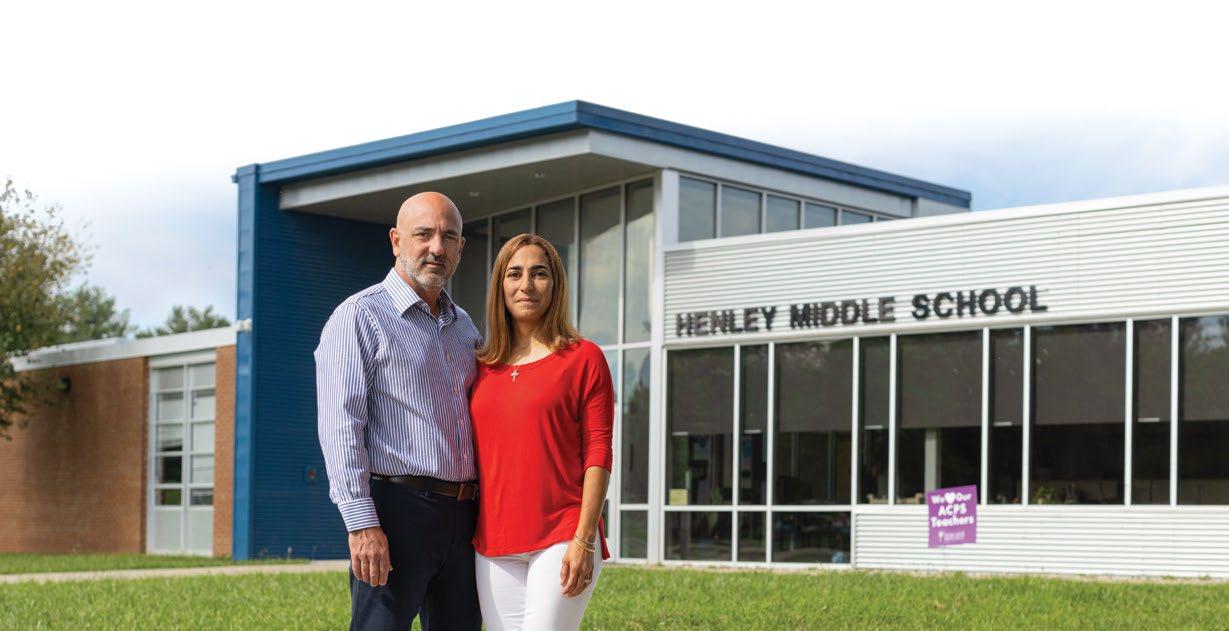 Carlos and Tatiana Ibañez stand resolute in front of their daughter’s school.
Carlos and Tatiana Ibañez stand resolute in front of their daughter’s school.
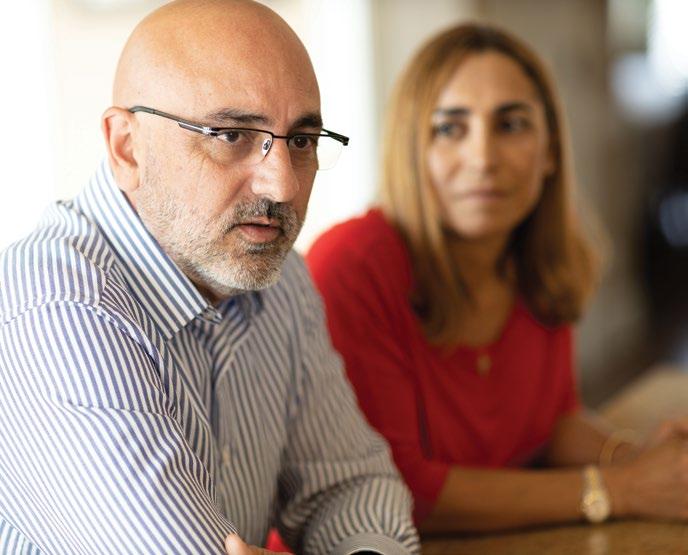

The Ibañezes tried to explain to the teacher how much harm this new curriculum was causing — and how unnecessary it was. Their oldest son had come through this school and graduated with honors. He’d put a lot of effort into getting good grades, they said, and would gain admission to a major university as a result. He’d never expressed any sense of oppression or rejection on account of his race.
“The system worked,” they told her. “Until now, we never thought about the color of our skin. Our daughter never felt inferior — until this.”
Unmoved, the teacher insisted that racism was everywhere, and it was the job of educators to ferret it out.
Carlos and Tatiana went home to have a talk with their children, reaffirming the values they’d tried so hard to teach them. “This [new curriculum] is going to be in all of your classes, and you need to ignore it,” they explained — knowing, even as they said it, that for them, ignoring what was happening was not an option.
F
or Matt and Marie Mierzejewski, the alarm bells began ringing during a weekly Zoom presentation used by the principal of their sons’ school to pass information along to parents. The principal mentioned a new pilot program the district was rolling out, effective in a few days: “Courageous Conversations About Race.” That title struck them as odd. Why was the school focused on students’ race?
“We started asking questions,” Marie says. “‘What’s the purpose of this?’ ‘Can we see some of the materials?’” The answers seemed suspiciously evasive; the materials hard to get. Once obtained, though, “it confirmed our fears.”
The new curriculum involved the same ideas about systemic racism being forced on the Ibañez children: concepts like “racial dominance” and “white privilege,” insinuations that Christian beliefs were racist and evil, admonitions that anyone — adult or child — not actively condemning racism (as defined by the program and its authors) must be bigots themselves.
Classroom discussions on sexual orientation were equally prevalent. Children were invited to choose labels for themselves and encouraged to embrace the enthusiasms of the LGBT agenda.
“It felt very inappropriate for the age,” Matt says. “My fear was, you’re putting these ideas in the forefront of everyone’s minds … ideology about race and gender. Somebody’s going to be hurt. Somebody’s going to be singled out.”
The “somebody,” it turned out, was his oldest son. Participating in a classroom discussion about the roles
of men and women, he was asked by another student what he thought of people who identify as transgender.
“I believe God only created two genders,” he said. “Male and female, from the moment of conception.” He shared some thoughts from his church youth group’s recent study on the topic, and did so with such grace that his teacher pointed out to the class how respectfully he had shared his beliefs.
Soon after, though, a student not in the class sent the Mierzejewskis’ son an email: “[T]hought you may need a reminder, the bible says ‘love they [sic] neighbor’. so id [sic] appreciate it if you stopped with all that transphobic, sexist, misogynistic crap you’ve been spouting around.”
“This is what we were worried about,” Marie says. She forwarded the email to administrators, who — rather than address the bullying email with the student who sent it — decided to investigate her son for supposedly provoking the other child’s anger.
“She could not admit that the email he received was wrong,” Marie says. “That name-calling is wrong.”
Marie pointed out that if her son had sent an email like the one he’d received, he would have been expelled. The administrator didn’t disagree.
“She made it very clear our Catholic beliefs had no place being expressed in school, even when he was asked,” Matt says. Indeed, officials across the district seemed increasingly bent on presenting a united front against parents’ concerns.
Nothing seemed to work. Teachers pointed parents to administrators, administrators directed them to district officials, officials sent them to the school board. Growing numbers of parents began sharing fears, frustrations, and ideas. They made calls, asked for meetings, sent emails, presented petitions at school board meetings. Request after request seemed to fall on deaf ears, as district officials aggressively embraced the new curriculum.
Divisions began to appear in Crozet — and rapidly deepened. Parents asked for more discussion and cooperation in working through the concerns. But district officials barely acknowledged them.
If enough people are willing to … stand for the truth, we can help administrators see that we need to move away from these ideological programs. ‘‘ Matt Mierzejewski
One evening, Carlos saw a news interview with Tanner Cross, a teacher in Loudon County, Virginia, fighting his own good fight against a school policy driven by politicized ideology. Standing with him, answering questions, was an attorney for Alliance Defending Freedom. On impulse, Carlos decided to reach out to ADF himself. Matt and Marie heard about what he was doing and wanted to help.

ADF attorneys recommended a lawsuit, and the Ibañezes, Mierzejewskis, and three other families agreed. “A lawsuit sounds almost harsh,” Carlos says, “but the idea was to put a pause — make sure, as parents, that we were giving input, and ensure that we were being heard.”
Earlier this year, a Virginia trial court dismissed the case;
it’s now on appeal to a state appellate court, where that court is being asked to reverse the lower court ruling.
“Litigation can take a lot of different paths, and it can be very long,” says Kate Anderson, ADF senior counsel and director of its Center for Parental Rights. “We’re still in the preliminary stages. But I feel good about our arguments … this is a very strong case.”
Besides which, Carlos says, time spent on CRT-based practices is time not spent on academics — a fact reflected in plunging test scores. The Virginia Department of Education released a report earlier this year that said schools’ focus on policies like Albemarle County’s policy “coincided with the widened gaps in student achievement.”
“I would like schools to focus on academic achievement,” Carlos says, “and let parents do the parenting. It’s not their job. Parents need to be aware of what the children are — and are not — being taught.”
“What we’re asking doesn’t come from a place of hate or fear of those who look different or believe different things than us,” says Marie. “We’re not looking for a public school to be a conservative or Christian school. We just want it to be school. And a place where all views are respected.”

“Really, the court is grappling with a new question,” says Vincent Wagner, senior counsel with ADF’s Center for Parental Rights. “It’s the first opportunity for the court to consider the discriminatory classroom practices required by a school board’s critical race theory-infused policy. Practices that are having a divisive impact on children, and that are being used to drive a wedge between these children and their parents.”
“It’s new ground all over the country,” says Anderson. “A lot of parent groups are watching this lawsuit carefully to see how they can apply it in their own school districts.”
“We do believe racism exists, and we want students taught true American history,” Matt says. “But they’re using this policy to push a political agenda … a hyperfocus on race that is going to cause racism.”
The lawsuit filed by ADF challenged the policy enacted by the Albemarle County School Board for multiple reasons:
1. Racial discrimination (via classroom practices designed to divide students from one another based on their race)
2. Suppression of free speech (of those opposing the school board’s ideas)
3. Religious discrimination (using materials that denigrate various faith beliefs)
4. Viewpoint discrimination (singling out and criticizing students — like the Ibañezes’ daughter and the Mierzejewskis’ son — for their beliefs)
5. Infringement of the rights of parents to protect their children and direct their education
A lawsuit sounds almost harsh, but the idea was to put a pause — make sure, as parents, that we were giving input, and ensure that we were being heard.
‘‘
Carlos Ibañez
Soon enough, word of the lawsuit got around, and the names of the families participating were published in the local paper, along with warnings that “these people are harmful to your children.” The fallout came fast. Some friends stopped saying hello. Some quit letting their children carpool with Marie. Carlos’s oral surgery practice began receiving negative reviews online — from people he had never seen or treated.
But the families have also found a strong measure of support — often from unexpected places. Office staffers in the schools whisper encouragement. So do some of Carlos’s patients. People come up in the grocery, or while one of the couples is walking their dog. Members of local churches have let them know they’re holding prayer services on their behalf.
An acquaintance saw Matt at one of his boy’s baseball games. “Hear you’re in some lawsuit,” he said. “What is it?” Matt explained; the man nodded his agreement. “I vote pretty left,” he said. “But these are just kids, man. Let them be kids. They don’t need to be teaching this stuff in school.”
“That was a good takeaway for me,” Matt says. “It gives me confidence that the majority of people believe the same as we do. If enough people are willing to step forward and stand for the truth, we can help administrators see that we need to move away from these ideological programs. We can get there — because the support is there. I don’t think we’re in the minority.”
[These] practices … are being used to drive a wedge between these children and their parents.
‘‘
Vincent Wagner, ADF Senior Counsel
Both families conceded that the situation has impacted their children. The Mierzejewskis’ son “is getting the looks,” Marie says. “We’ve taken a stand, and he’s getting marked.” It saddens Tatiana to see her daughter having to do what she and Carlos did, all those years ago in Panama: be ever careful of what she says, and who she’s talking to.
But there have been rewards, too. “It’s made my faith stronger,” Tatiana says. “I pray more. And I’m trying to get my kids to do the same.”
“It’s been a great life lesson in doing what’s right, even when it’s hard,” Marie says. “Loving people who

think terrible things of you. Not letting our hearts get hardened by that.”
“We had to show our kids what it means to ‘be the example,’” Carlos says. “If you believe something is wrong or that you’ve been wronged, you need to speak up. This is a country where you should be able to speak up and disagree and have those conversations.”
Marie had such a conversation, outside the polls in her neighborhood, where elections for the local school board were underway. Many of the parents had worked to get a candidate elected who shared their views on the school board’s policy, and she was standing near the polling station, urging people to vote for him.
ADFlegal.org/issues/parental-rights to learn more about how ADF is defending the rights of parents.
A woman walked up to her and said, “I have a problem with this guy.” She was the mother of a student who identified as transgender, convinced her child would be mistreated if the policy were toned down or removed.
“We talked for 45 minutes,” Marie remembers. “It was kind and loving. A calm, reasonable, compassionate conversation. I doubt she wound up voting for our candidate, but I walked away thinking, ‘Thank You, Jesus.’ Both of us were feeling so protective of our children. But we heard each other.”
You’ll hear a lot, on the news, about the uproar over education in Virginia. But in Albemarle County, people are listening, too.”
The Government Says Our Children’s Home Must Choose
By Bradley WilliamsWorking with abused and neglected children, I’ve seen the worst of the worst.
Harper and Shawna* watched their mother struggle with drugs and a string of abusive boyfriends before she ended up in prison. The young girls were left without a home.
Christopher spent his first four years in a house that also served as a meth lab. By the time he entered foster care, he was terrified of adults and couldn’t speak in full sentences.
I’ve watched countless hurting kids come through Holston United Methodist Home for Children, where I’ve worked for 20 years. All of them have their own unique, difficult stories, but — thankfully — they also all have the same hope available to them: knowing Jesus Christ and being transformed by His love.
Iwas called to this kind of work 30 years ago, during a dark period in my own life. I was a sophomore at the University of Tennessee and had just gone through a difficult breakup with a girl I thought I was going to marry. My dad had just passed away from cancer. Though I had a strong foundation as a Christian, I was not close to the Lord.
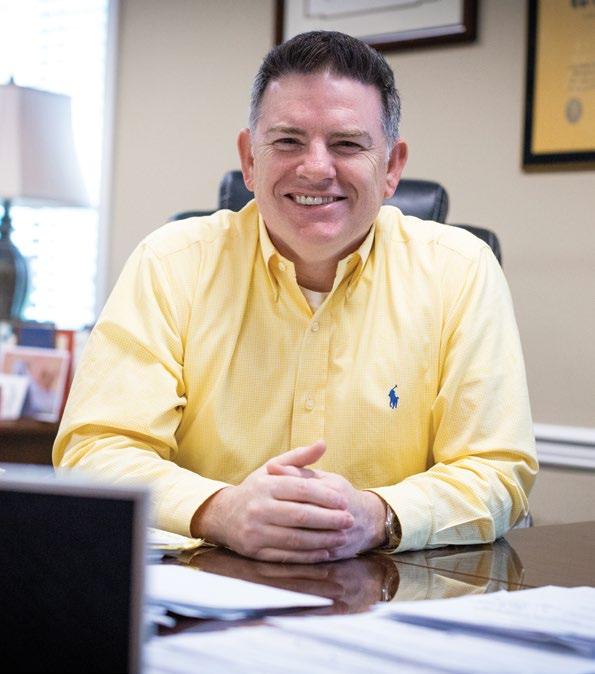
Gospel with her. She gave her life to the Lord and began to heal from her childhood trauma.
Months later I was talking with her on the phone, smiling as she told me about the good things that were happening in her life. She thanked me for sharing the Lord with her. I was so overwhelmed when I hung up the phone that I just dropped to my knees and started weeping. “God,” I asked, “how could You use me to do something so incredible when I’m so unfaithful?”
We want to minister to children and families in the way we were called — the way we know is most effective and most honoring to the God we serve. ‘‘
Bradley Williams
And then the Lord placed a call on my heart: “I want you to do that for the rest of your life.” It was powerful — so close to an audible voice, I was afraid to open my eyes because I thought I might see Him. This wasn’t that still, small voice that Scripture talks about. This was close to a burning-bush experience. It was clear that I was to work with people who had been abused and share the Gospel with them.
Then I found myself in a conversation with a friend who shared with me that she had been sexually abused by a relative years before. She hadn’t told anyone else about the experience. I knew only one way to offer hope — and despite my lukewarm Christian state, I shared the
I knew I couldn’t say no to what He was telling me to do.
Until that point, I had been a typical college guy. I wanted to make a lot of money, be famous, do incredible things in the world. A communications scholarship was nudging me in that professional direction. I realized my
new path wasn’t likely to lead to any of that, but God’s direction was clear. The next day I turned in my scholarship and switched my major to psychology.
God ultimately led me to Holston Home, where I now serve as president and CEO. Founded in 1895, Holston has helped more than 8,000 children. A widow named Elizabeth Wiley began the ministry when she answered the Lord’s call in her own life and began taking in homeless children. Started as a dormitory-style orphanage in rural Tennessee, Holston has grown to a multifaceted ministry that includes child-placement services, residential programs, and a Christian school on a 155-acre campus.
Holston Home receives some reimbursement for our adoption and foster care programs through funding from the U.S Department of Health and Human Services (HHS). But a rule instituted during President Obama’s administration required faith-based agencies to violate their religious beliefs to receive the funding. The rule forced ministries to place children in homes that don’t align with their faith, such as with non-Christian or same-sex couples, or unmarried couples who live together.
HHS provided religious exemptions during President Trump’s administration. But in the last two years, under President Biden’s administration, HHS has rescinded all the exemptions and restored the rule. At any moment, the administration could force us to close our childplacement programs or cut off funding.
That’s why Alliance Defending Freedom is representing us in a lawsuit against the Department of Health and Human Services. We won’t violate our deeply
held religious beliefs to ensure that we receive funding. We want to minister to children and families in the way we were called — the way we know is most effective and most honoring to the God we serve.
People ask me sometimes how I can do this work without becoming jaded or depressed. I tell them it’s because I know God can heal and transform. He’s done it for me, and He’s done it for so many of the children we serve.
Mark arrived at Holston Home as a teenager, trusting no one because of the abuse he had endured as a child.
But as he formed relationships with caring adults at Holston Home, he discovered the truth about God’s great love for him. After giving his life to Christ, he expressed his newfound hope in a school writing assignment. “Life is just beginning,” he wrote. “The chance to live life is just around the corner!”
Not every story ends the way we would hope, once we part ways with the children we serve. But we plant seeds that we pray will bear fruit later in life. And, sometimes, we’re able to see the transformation in real time. It doesn’t get any better than that.
My hope is that government officials will allow faith-based ministries like ours to continue providing the care that leads to changed lives.
*Names of some children have been changed. WATCH Bradley Williams share Holston Home’s story at ADFlegal.org/fj-holston.

Kristen Waggoner assumed the post of Alliance Defending Freedom CEO and president on October 1. She also continues in her role as general counsel. Waggoner joined ADF in 2013. Under her leadership on the U.S. legal team, ADF has secured 13 of ADF’s 14 U.S. Supreme Court wins since 2011. Waggoner personally argued and won two of these victories before the high court: Masterpiece Cakeshop v. Colorado Civil Rights Commission and Uzuegbunam v. Preczewski. She is slated to argue her third, 303 Creative v. Elenis, later this year. A sought-after national speaker on legal and cultural issues, Waggoner regularly comments on religious freedom issues in television, radio, and print media. She is a wife of 30 years and the mother of three children. She also exerts a certain amount of authority over two dogs and an annoying cat.
F&J: What drew you to ADF nine years ago?
KW: After a judicial clerkship, I practiced law for 16 years at a private firm in Seattle. I was a partner at my firm and loved my role and my colleagues there. But over time, God began to tug at my heart to do more to protect fundamental freedoms for my children and future grandchildren. This concern grew as I worked with ADF to defend clients in the state of Washington. I litigated a case on behalf of the Stormans family and two pharmacists who were forced by the government to choose between dispensing abortifacients and losing their licenses. Another case that grabbed my attention was Barronelle Stutzman’s [Arlene’s Flowers]. Back then, Barronelle’s case was one of the very first targeting Christian artists. I was astonished that the government would try to ruin someone because they had a different view of marriage.
I also remembered something my dad, who worked in ministry, used to tell me — that wherever and whenever He calls, we go. ADF had approached me a few times over the years, but I couldn’t bring myself to leave my firm.

Over time, God began to tug at my heart to do more to protect fundamental freedoms for my children and future grandchildren.
When I attended the 2013 ADF Academy on Religious Liberty, I knew it was time for me to take a step of faith. So, I asked Gary McCaleb, who led the U.S. team, to meet me in the hotel lobby. “I’m ready,” I said, “if ADF will have me.” I’ll never forget that moment.
F&J: After being at ADF almost a decade, what do you find that you like best about the organization?
KW: It comes down to three primary distinctives. First, ADF’s mission — to keep doors open for the Gospel — is
It is such an inspiration to look to my left and right and see people who share a deep commitment to Christ and feel called to do this work for His glory. ‘‘
Kristen Waggoner
central to all it does. We are a ministry, and every decision we make is about that mission. Jesus is everything. Second, ADF has always been willing to go to difficult places and take on difficult tasks when others shy away. Finally, ADF has a comprehensive alliance approach that doesn’t just involve litigation. It engages in training, grants to allies, legislative support, alliance work, and public advocacy. ADF has always understood that no one organization can do all this work alone.
I love the people at ADF, too. The blessing of the people has exceeded anything I could have imagined. My brother came to an ADF event, and afterward he said to my parents, “Kristen is with her people.” It is such an inspiration to look to my left and right and see people who share a deep commitment to Christ and feel called to do this work for His glory. They inspire me.
F&J: What are the key challenges that ADF is facing?
KW: God has been so good to us, helping us to achieve amazing victories in legislative halls and courtrooms on six continents. That success on behalf of clients and freedom has caused opponents to target us in a variety of ways, including economically. The SPLC put us on a defamatory hit list. Microsoft took away our nonprofit pricing. Other software companies have canceled us. So, the operational side of our ministry is facing challenges like never before.
The targeting of ADF specifically reflects a broader trend of government and private institutions targeting people of faith. It’s why we’re receiving an unprecedented number of requests for help — over 10,000 in the past year alone, from all over the world. As a global ministry, we see that religious persecution is occurring at alarming levels across the globe and that Christians are the most persecuted group on the planet. Our International team is working daily to help save lives, lessening the violence and criminal punishment Christians face.
We see that persecution not only in closed societies, but increasingly in the United States and across the West.
Early stages of state-sponsored persecution include social marginalization [Cancel Culture], economic boycotts, and the misuse of the law to punish those who believe in God’s standards for human dignity and sexuality. This persecution is spurred on by the federal government as it pushes a pro-abortion and anti-family agenda, and by local school boards as they seek to indoctrinate children in harmful critical theory-based ideologies.
F&J: How is ADF uniquely poised to meet those difficulties?
KW: God has and will continue to equip us with the team, the creativity, the initiative, and the strategies to meet the challenges ahead. We’ve been blessed to move from reactive defense to strategy-driven offense. We’re not waiting for cases to come along; we’re seeking opportunities to protect freedom in every sphere — churches, schools, corporate boardrooms, and legislative halls, as well as courtrooms. We are positioned to engage more and more at the state level, to expand our church and ministry alliances, to assist in legislation and litigation in new ways involving parental rights and that stop the Biden administration from its unconstitutional orders.
F&J: Are you hopeful?
KW: With every challenge comes an opportunity. ADF is being presented with more opportunities than ever before, and we’re so grateful that God has chosen us to live in this precise moment and positioned us to embrace these challenges as we co-labor with our alliance partners and Ministry Friends around the world. We know that He promises to use the work of our hands for His eternal purpose. So, we can rest in the conviction that we are called to be faithful, and that He will use that faithfulness in ways that often exceed our expectations.
When we spend time with our Savior, we can rest assured we will reflect His character and walk with courage into whatever He calls. That’s the promise of the Christian, and it’s what we hope people see in ADF team members.

50 Worshippers Were Gunned Down In Nigeria, And Western Leaders Have Barely Noticed
By Paul ColemanNearly a decade ago, an editorial in The Times of London warned of the worldwide rise in attacks on Christians.
“Across the globe, the Middle East, Asia and Africa,” it stated, “Christians are being bullied, arrested, jailed, expelled, and executed. Christianity is by most calculations the most persecuted religion of modern times. Yet Western politicians until now have been reluctant to speak out in support of Christians in peril…. We cannot be spectators at this carnage.”
Yet here we are, almost 10 years on, and very little has changed. The persecution has intensified, and the silence of Western leaders continues to be deafening.
Take their approach to Nigeria, where Islamists mainly concentrated in the North have been persecuting Christians with something close to impunity in recent years. In June, for example, an Islamic terrorist group broke into a Catholic church in Ondo State, in southwestern Nigeria, and began a shooting rampage that left at least 50 dead, including children.
Explosives brought the ceiling down on worshippers while they were celebrating Pentecost. The message was clear: even Christians in the relatively peaceful state of Ondo are not safe.
In northern Nigeria, the situation is much worse. In May, in Sokoto State, a college student named Deborah Emmanuel Yakubu was stoned, beaten to death, and burnt by her classmates. She was accused of blasphemy and insulting the Prophet Muhammad after she thanked Jesus on social media for helping her pass an exam.
Videos and images of her horrifying death traveled quickly through local media, leading to widespread outrage. This, in turn, triggered protests defending her attackers. Protesters in Sokoto broke into churches and set them on fire. And radicalized Muslims threatened other Christians throughout the North with death after they were also accused of blasphemy.
These are just some of the latest examples in a seemingly never-ending list of atrocities against Christians in Nigeria. Yet there is no international outcry. There are no grand foreign-policy initiatives. There are no emergency summits.
Instead, there are news stories locally and internationally quoting political leaders who claim it is too early to speculate about why gunmen would target a church, or why a Christian was stoned and beaten to death for mentioning Jesus. Then the news cycle moves on, and nothing changes.
The willful indifference of Western politicians to the plight of Christians is striking. In the European Union, members of the European Parliament recently rejected a motion to debate Christian persecution and failed to condemn the murder of Deborah Emmanuel. In the U.S., the Biden administration removed Nigeria from its list of “countries of particular concern” — a decision that becomes more shocking by the day. And while the U.K. government is on record as acknowledging jihadist activity as a “driver” of violence in Nigeria’s northeastern region (where neither of the aforementioned tragedies unfolded), it fails to do so for the rest of Nigeria, blaming instead a “competition over resources” for the violence.
multimillion-dollar budget, it took the court over a decade to conclude its “preliminary examination” into Nigeria. Having then made the decision to open an investigation in 2020, it then took over two years for the ICC prosecutor to visit Nigeria, which he did this April.
The accompanying ICC press release includes such phrases as “engagement,” “deepening cooperation,” “dialogue to promote complementarity,” and “a new chapter of enhanced collaboration” — but mentions nothing of the ongoing slaughter.
Afew weeks after the devastating attack on the Nigerian church, the U.N. Human Rights Council again gathered in Geneva, Switzerland, to discuss action on the most pressing human-rights challenges facing the world. At least that was the theory. In reality, the systemic persecution of Christians was not on the official agenda. It never has been. Instead, if you were to ask African diplomats what the biggest foreignpolicy priority of Western nations is — based on the lobbying and intense behind-the-scenes debates that accompany such U.N. sessions — they would likely conclude that it is ensuring that “comprehensive
Christianity is by most calculations the most persecuted religion of modern times. Yet Western politicians until now have been reluctant to speak out in support of Christians in peril.
Paul Coleman
sexuality education,” “reproductive rights,” and “sexual-orientation and gender-identity rights” are rolled out across Africa.
Yet it is the response of the international bodies specifically designed to deal with human rights violations that is most outrageous. The International Criminal Court (ICC) was established to deal with the most serious of crimes, including war crimes, crimes against humanity, and genocide. Despite the ICC’s
Responding to the global rise in Christian persecution is certainly not easy, and no one is claiming there are quick and easy answers. Yet we have not even taken the first step — which is to acknowledge it is happening. Western leaders remain spectators to the carnage.
Paul Coleman is executive director of ADF International. This was adapted from an article that originally appeared at Spiked on June 10, 2022.
“ADF has shown that they stand for God’s purposes. Giving to ADF through my estate plan is one way to help ensure that future generations have someone to speak for them.”
— Calvin G.
